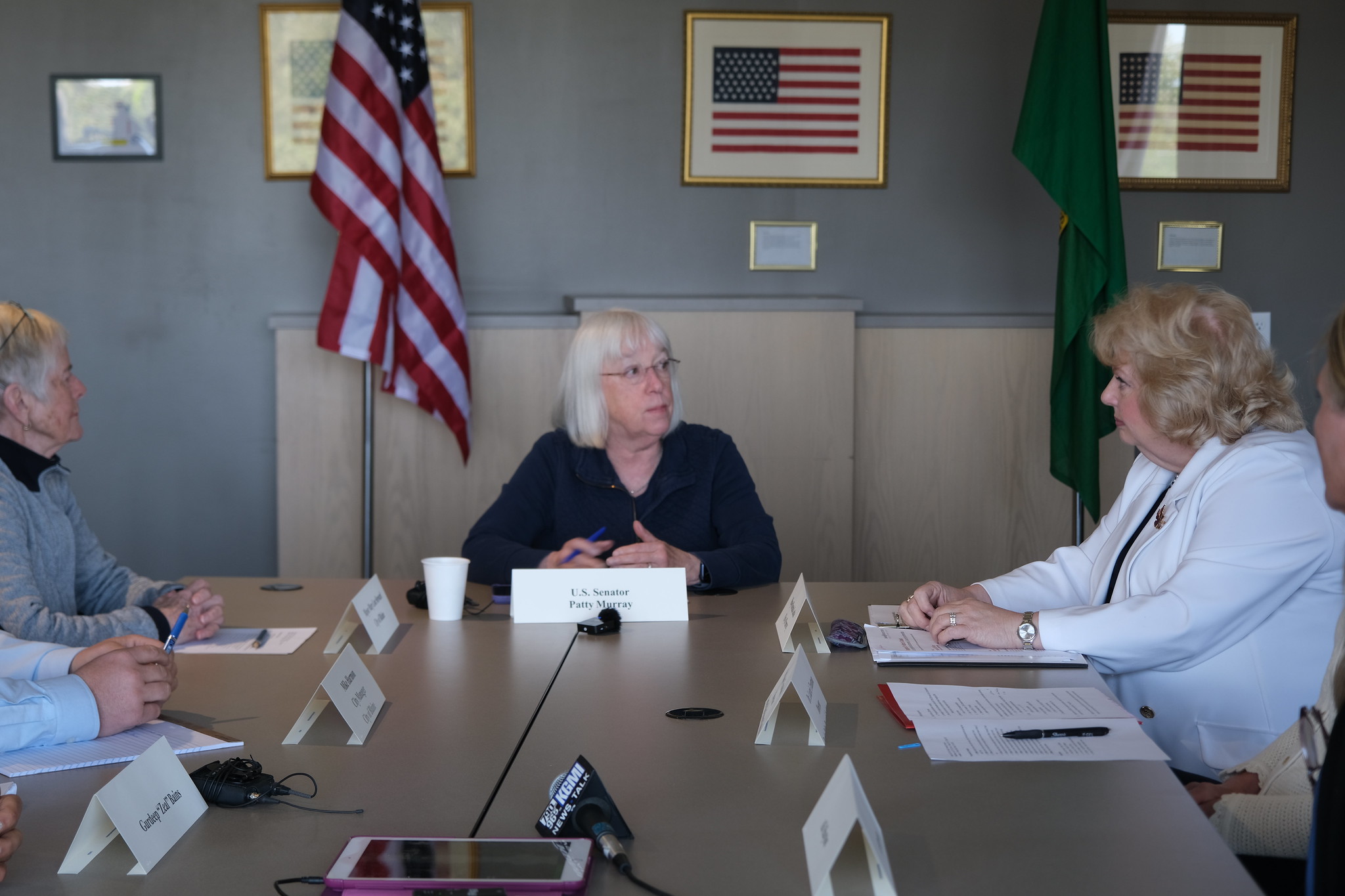BLAINE, WA (MyBellinghamNow.com) – U.S. Senator Patty Murray was in Blaine on Thursday, April 25, to gauge the impact of Canadian tariffs on local border communities.
The senator heard from Blaine Mayor Mary Lou Steward, Surrey Mayor Brenda Locke and Point Roberts Marketplace owner Ali Hayton during the meeting, among other local stakeholders.
Steward began the discussion by explaining how Blaine has been hit particularly hard by the recent drop in Canadian visitors. There’s been more than a 50 percent decrease in the volume of Canadians traveling south over the border into the U.S. throughout the first two weeks of April from the same time last year, according to Western Washington University’s Border Policy Research Institute (BPRI).
Steward emphasized to the senator how crucial Canadian shoppers are to Blaine’s economy, with much of the revenue coming from those who buy gas and dairy and pick up Amazon deliveries. With gas now becoming cheaper in Canada than in Blaine, she says the drop in visitors could have potentially devastating effects on the city.
“Sales tax receipts eclipse property tax receipts nearly by two to one, so sales tax is really, really important,” Steward said. “It takes all of Blaine’s property tax plus sales tax receipts to fund our police department … and that’s why everything hinges on this.”
Blaine’s retail and service revenue has fallen 40 percent since the start of the trade war, and Steward layoffs have already begun at local businesses.
Mayor Locke from Surrey echoed Steward’s sentiments on the importance of cross-border travel for local businesses, adding that the effects of the Trump administration’s policy and rhetoric go exceed finances.
“It’s far beyond just an economic imposition on us, it’s just our way of life,” Locke said. ” It’s a tax on people, it’s a tax on neighborhoods, it’s a tax on families, on businesses, and they are going to be ultimately the ones that pay the price.”
Laurie Trautman, director of WWU BPRI, says the economic shock feels similar to the impact from the COVID-19 pandemic. She says increased enforcement at the border has led to a tax on personal goods for Canadians coming back into their country, which dissuades them from shopping in the United States.
Someone who’s been suffering from those taxes is Ali Hayton, owner of Point Roberts Marketplace. She says local residents depend on her store to buy basics like food and medicine, but with 80% of her summer business coming from Canadian shoppers, the outlook seems bleak.
“If I don’t make it, Point Roberts becomes a food desert,” Hayton said. “I feel like most of the people in Point Roberts really just feel like we are alone in this, we don’t have help. The county’s been completely nonexistent.”
Going beyond the economic impact, Hayton says rhetoric has been a critical concern. She says many Canadian citizens have had their views of Americans skewed to the point that she’s been called a fascist. She says the shock of COVID was helped by letters of support and donations coming in from Canadians, but those gifts have now turned into hate mail from cities as far as Ottawa.
In turn, Murray expressed her dissatisfaction with the Trump administration’s “derogatory comments” towards Canada, which she believes to be fueling the rhetoric on both sides. She says it will be crucial for Congress to re-assert its authority to rein in the tariffs and temper down the trade war that has affected so many communities.
“Every week Trump seems to find a new way to drive a wedge between us and our Canadian allies, and a new way to drive business away from our communities,” Murray said “The pointless, painful trade war is in reality an enormous tax paid by our families. All of this is incredibly harmful to our communities—it’s not the way we should treat our neighbors, and it’s catastrophic for business too.”






